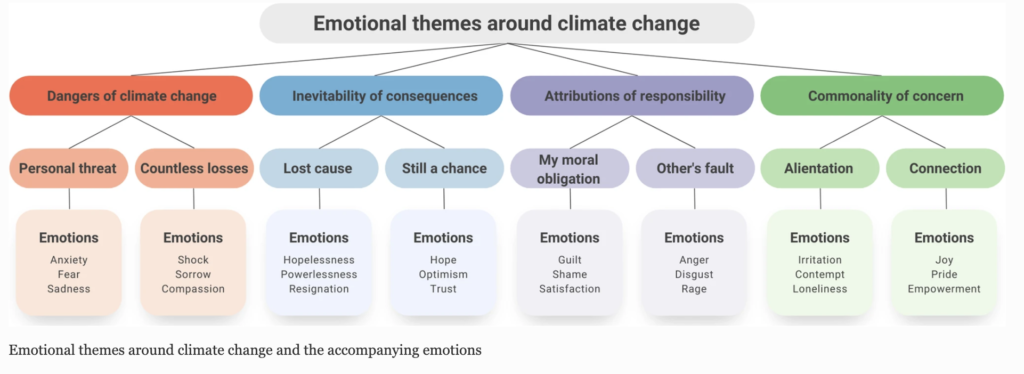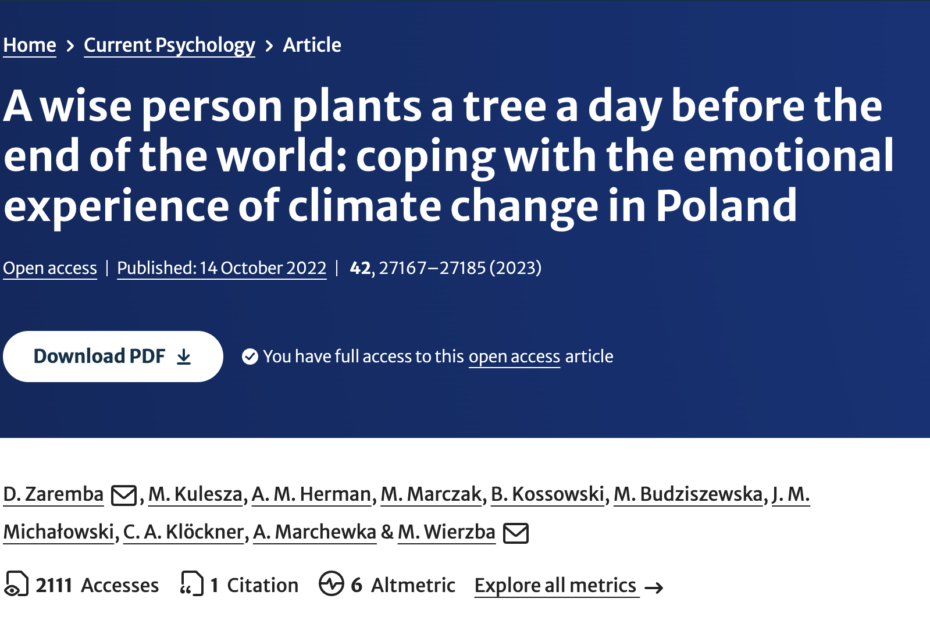“A wise person plants a tree a day before the end of the world: coping with the emotional experience of climate change in Poland” is the first research paper in the Climate Change Emotions project published in a peer-reviewed journal. The article reports the results of 40 interviews conducted in March-May 2021 among Poles concerned about climate change.
“We mapped a diverse landscape of emotions related to climate change experienced by Polish people from different backgrounds, life situations, professions and age groups. We heard about many negative and overwhelming emotions, but also about nurturing relationships, bravery, optimism and hopes for the future,” says Dominika, who analyzed the interviews. An exciting and optimistic finding is that people concerned about climate change are resilient and flexible in their use of coping strategies, that allow them to navigate emotions. As a result, many people were able to take care of their well-being while maintaining a long-term commitment to climate action.
What are the main topics that evoke emotions related to climate change?
A variety of emotions related to climate change were identified and placed in the context of four major themes: dangers posed by climate change, the inevitability of its consequences, attributions of responsibility, and commonality of concern. We noticed, that participants struggled between conflicting or opposite emotions towards these aspects of climate change, so we named different “subthemes”, that related to those contradictory emotions. If you want to learn more about how we came about the graph of themes below, take a peak into the “Results” section of the article.

Coping with emotions related to climate change
Sometimes people wonder – does it make sense to sort the garbage, if it changes so little? Or is it bad to detach from the climate news and watch Netflix? We learned, that people use a variety of coping strategies to deal with emotions related to climate says. They used them flexibly, according to their needs and the demands of the situation. After all, who are we to tell, which strategy is right or wrong? We know, that these strategies worked – allowed people to regenerate, to restore meaning in life and to fight the hopelessness, that discouraged them from taking action
Our participants frequently changed their everyday behaviours and took part in climate action to try to solve the core problem – climate change. Choosing a bike over a car helped them reduce guilt, and collective climate action was a source of empowerment and many positive emotions, like joy, awe and pride and a sense of belonging. On the other hand, participants noted, that imbalance between climate action and regeneration could lead to exhaustion and burnout.
We learned about many meaning-focused coping strategies, such as self-distancing, deciding to see things in a more positive way, mindful acceptance of one’s negative emotions and appreciation for positive experiences in nature.
People usually have the most reservations about emotion-focused strategies, which help to alleviate emotional discomfort instead of solving the problem at the core. “People shouldn’t focus on pleasing themselves when the world is on fire!”. We get the argument of the urgency of the current situation, but a burned-out activist cannot help the burning earth. Emotion-focused strategies are important and necessary for regeneration. Talking to a friend, taking a nap, disconnecting from grim climate news or eating something delicious allowed our participant to rest.
Thank you to everyone who made this research possible!
The respondents’ experiences can be an inspiration for people who feel overwhelmed by climate change or for professionals who help such people. The publication would not have been possible without the involvement of the people who agreed to give interviews and talk about their experiences. We thank them all very much!
Sincere congratulations to coauthors: Dominika Zaremba, Maria Kulesza, Aleksandra Herman, Bartosz Kossowski, Artur Marchewka and Malgorzata Wierzba of LOBI, Michalina Marczak and Christian Kloeckner of the Norwegian University of Science and Technology (NTNU), Jaroslaw Michalowski of SWPS University and Magdalena Budziszewska of Warsaw University.
The article is published in open-access and available for anyone to read. Enjoy:
